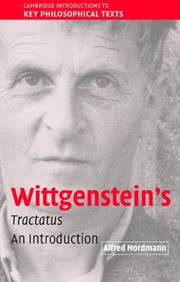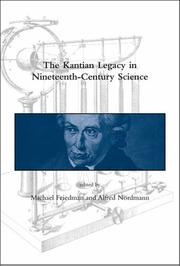| Listing 1 - 10 of 55 | << page >> |
Sort by
|

ISBN: 0521616387 9780521616386 052185086X 9780521850865 9780511614750 051112631X 9780511126314 0511124171 9780511124174 0511125453 9780511125454 0511614756 1107153808 9781107153806 0511643934 9780511643934 9786612394386 6612394382 0511568142 9780511568145 128239438X 051119983X Year: 2005 Publisher: Cambridge Cambridge University Press
Abstract | Keywords | Export | Availability | Bookmark
 Loading...
Loading...Choose an application
- Reference Manager
- EndNote
- RefWorks (Direct export to RefWorks)
Ludwig Wittgenstein's 'Tractatus Logico-Philosophicus' is one of the most important books of the twentieth century. It influenced philosophers and artists alike and it continues to fascinate readers today. It offers rigorous arguments but clothes them in enigmatic pronouncements. Wittgenstein himself said that his book is 'strictly philosophical and simultaneously literary, and yet there is no blathering in it'. This introduction, first published in 2005, considers both the philosophical and the literary aspects of the 'Tractatus' and shows how they are related. It also shows how the work fits into Wittgenstein's philosophical development and the tradition of analytic philosophy, arguing strongly for the vigour and significance of that tradition.
Wittgenstein, Ludwig J.J. --- Language and logic --- Wittgenstein, Ludwig, --- Wittgenstein, Ludwig --- Linguistics and logic --- Logic in language --- Language and languages --- Logic --- Semantics --- Philosophy --- Language and logic. --- Arts and Humanities --- Wittgenstein, Ludwig, - 1889-1951. - Tractatus logico-philosophicus
Book
Year: 2019 Publisher: New York, New York : Association for Computing Machinery,
Abstract | Keywords | Export | Availability | Bookmark
 Loading...
Loading...Choose an application
- Reference Manager
- EndNote
- RefWorks (Direct export to RefWorks)
Computer networks --- Human-computer interaction --- Information society --- Information technology
Periodical
Year: 2015 Publisher: London Pickering and Chatto
Abstract | Keywords | Export | Availability | Bookmark
 Loading...
Loading...Choose an application
- Reference Manager
- EndNote
- RefWorks (Direct export to RefWorks)
Book
ISBN: 9048190509 9786612995590 9048190517 1282995596 Year: 2010 Publisher: Dordrech ; New York : Springer,
Abstract | Keywords | Export | Availability | Bookmark
 Loading...
Loading...Choose an application
- Reference Manager
- EndNote
- RefWorks (Direct export to RefWorks)
We increasingly view the world around us as a product of science and technology. Accordingly, we have begun to appreciate that science does not take its problems only from nature and then produces technological applications, but that the very problems of scientific research themselves are generated by science and technology. Simultaneously, problems like global warming, the toxicology of nanoparticles, or the use of renewable energies are constituted by many factors that interact with great complexity. Science in the context of application is challenged to gain new understanding and control of such complexity—it cannot seek shelter in the ivory tower or simply pursue its internal quest for understanding and gradual improvement of grand theories. Science in the Context of Application will identify, explore and assess these changes. Part I considers the "Changing Conditions of Scientific Research" and part II "Science, Values, and Society". Examples are drawn from pharmaceutical research, the information sciences, simulation modelling, nanotechnology, cancer research, the effects of commercialization, and many other fields. The book assembles papers from well-known European and American Science Studies scholars like Bernadette Bensaude-Vincent, Janet Kourany, Michael Mahoney, Margaret Morrison, Hans-Jörg Rheinberger, Arie Rip, Dan Sarewitz, Peter Weingart, and others. The individual chapters are written to address anyone who is concerned about the role of contemporary science in society, including scientists, philosophers, and policy makers.
Science -- Social aspects. --- Technology -- Social aspects. --- Research --- Science --- Physical Sciences & Mathematics --- Philosophy & Religion --- Philosophy --- Sciences - General --- Methodology --- Social aspects --- Research. --- Philosophy. --- History. --- Philosophy and science. --- Sociology. --- Philosophy of Science. --- History of Science. --- Sociology, general. --- Science research --- Scientific research --- Information services --- Learning and scholarship --- Research teams --- Normal science --- Philosophy of science --- Annals --- Auxiliary sciences of history --- Social theory --- Social sciences --- Science and philosophy

ISBN: 0262062542 9780262062541 Year: 2005 Publisher: Cambridge (Mass.) MIT press
Abstract | Keywords | Export | Availability | Bookmark
 Loading...
Loading...Choose an application
- Reference Manager
- EndNote
- RefWorks (Direct export to RefWorks)
The contributions of Kantian thought to modern mathematics, mathematical logic, and the foundations of mathematics are now widely acknowledged by scholars. As the essays in this volume show, the general development of modern scientific thought--including the physical sciences, the life sciences, and mathematics--can be viewed as an evolution from Kant through Poincaré to Einstein and the logical positivists and beyond. Focusing on nineteenth-century science, the essays--by historians of philosophy, science, and mathematics--trace the multiple intellectual transformations that have led from Kant's original scientific situation to the scientific problems of the twentieth century.The book examines Kant's influence on five strands of nineteenth-century scientific thought: Naturphilosophie and the effect of German Romanticism (especially Goethe) on biology; Fries's philosophy of science; Helmholtz's rejection of Naturphilosophie and Romanticism; neo-Kantianism and its return to "methodological" concerns in natural science and academic philosophy; and Poincaré and his reflections on scientific epistemology. The essays give a nuanced picture of Kant's legacy to nineteenth-century thinkers and of the rich interaction between philosophical ideas and discoveries in the natural and mathematical sciences during this period. They point to the ways that the scientific developments of the nineteenth century link Kant's thought to the science of the twentieth century.
Philosophy and science --- Science --- Science and philosophy --- History --- Philosophy --- Kant, Immanuel, --- Kant, Emmanuel --- Kant, Emanuel --- Kant, Emanuele --- Kant, Immanuel --- Kant, I. --- Kānt, ʻAmmānūʼīl, --- Kant, Immanouel, --- Kant, Immanuil, --- Kʻantʻŭ, --- Kant, --- Kant, Emmanuel, --- Ḳanṭ, ʻImanuʼel, --- Kant, E., --- Kant, Emanuel, --- Cantơ, I., --- Kant, Emanuele, --- Kant, Im. --- קאנט --- קאנט, א. --- קאנט, עמנואל --- קאנט, עמנואל, --- קאנט, ע. --- קנט --- קנט, עמנואל --- קנט, עמנואל, --- كانت ، ايمانوئل --- كنت، إمانويل، --- カントイマニユエル, --- Kangde, --- 康德, --- Kanṭ, Īmānwīl, --- كانط، إيمانويل --- Kant, Manuel, --- Science - Philosophy - History - 19th century --- Philosophy and science - History - 19th century --- Kant, Immanuel, - 1724-1804

ISBN: 1282097199 9786612097195 0262273268 142947730X 0262294036 9780262273268 0262062542 9780262062541 9781429477307 9781282097193 6612097191 9780262294034 Year: 2006 Publisher: Cambridge, Mass. MIT Press
Abstract | Keywords | Export | Availability | Bookmark
 Loading...
Loading...Choose an application
- Reference Manager
- EndNote
- RefWorks (Direct export to RefWorks)
"Historians of philosophy, science, and mathematics explore the influence of Kant's philosophy on the evolution of modern scientific thought."--Jacket.
Science --- Philosophy and science --- Philosophy --- History --- Kant, Immanuel, --- Science and philosophy --- Kant, Emmanuel --- Kant, Emanuel --- Kant, Emanuele --- COMPUTER SCIENCE/Programming Languages --- Kant, Immanuel --- Kant, I. --- Kānt, ʻAmmānūʼīl, --- Kant, Immanouel, --- Kant, Immanuil, --- Kʻantʻŭ, --- Kant, --- Kant, Emmanuel, --- Ḳanṭ, ʻImanuʼel, --- Kant, E., --- Kant, Emanuel, --- Cantơ, I., --- Kant, Emanuele, --- Kant, Im. --- קאנט --- קאנט, א. --- קאנט, עמנואל --- קאנט, עמנואל, --- קאנט, ע. --- קנט --- קנט, עמנואל --- קנט, עמנואל, --- كانت ، ايمانوئل --- كنت، إمانويل، --- カントイマニユエル, --- Kangde, --- 康德, --- Kanṭ, Īmānwīl, --- كانط، إيمانويل --- Kant, Manuel,
Book
ISBN: 3030897087 3030897079 Year: 2022 Publisher: Cham, Switzerland : Springer,
Abstract | Keywords | Export | Availability | Bookmark
 Loading...
Loading...Choose an application
- Reference Manager
- EndNote
- RefWorks (Direct export to RefWorks)
Creative ability --- Technological innovations --- Study and teaching --- Creativeness --- Creativity --- Ability --- Creation (Literary, artistic, etc.)
Book
ISBN: 9789048190508 9789048190515 Year: 2010 Publisher: New York Springer
Abstract | Keywords | Export | Availability | Bookmark
 Loading...
Loading...Choose an application
- Reference Manager
- EndNote
- RefWorks (Direct export to RefWorks)
Suggests that the problems of scientific research today are generated by science and technology as well as nature.--
Philosophy --- Theory of knowledge --- Philosophy of science --- Sociology --- Pure sciences. Natural sciences (general) --- wetenschapsgeschiedenis --- sociologie --- filosofie --- epistomologie --- Research --- Science --- Science research --- Scientific research --- Information services --- Learning and scholarship --- Methodology --- Research teams --- Science and society --- Sociology of science --- Social aspects
Book
ISBN: 3031267834 3031267826 Year: 2023 Publisher: Cham, Switzerland : Springer,
Abstract | Keywords | Export | Availability | Bookmark
 Loading...
Loading...Choose an application
- Reference Manager
- EndNote
- RefWorks (Direct export to RefWorks)
The book addresses the challenge of living in a multilingual world from three perspectives: socio-linguistics and the study of multilingualism in contrast, philosophy of technology with its emphasis on the world as a technosphere—how it is made, how it is experienced, and how it can be managed, and then pedagogy and the question of teaching and learning to competently negotiate multilingual environments. In today‘s multicultural and multilingual world, technologies provide a common ground. The story of the technosphere as a multilingual environment offers new perspective, namely that of learning to cooperate and coordinate.
Engineering—Data processing. --- Computers and civilization. --- Computational intelligence. --- Data Engineering. --- Computers and Society. --- Computational Intelligence. --- Intelligence, Computational --- Artificial intelligence --- Soft computing --- Civilization and computers --- Civilization --- Sublanguage. --- Technology and civilization. --- Multilingualism. --- Language and languages --- Civilization and machinery --- Civilization and technology --- Machinery and civilization --- Social history --- Technology --- Language for special purposes --- Restricted language --- Special language --- Discourse analysis --- Semantics --- Register (Linguistics) --- Philosophy --- Variation
Digital
ISBN: 9789048190508 9789048190515 Year: 2011 Publisher: Dordrecht Springer
Abstract | Keywords | Export | Availability | Bookmark
 Loading...
Loading...Choose an application
- Reference Manager
- EndNote
- RefWorks (Direct export to RefWorks)
Philosophy --- Theory of knowledge --- Philosophy of science --- Sociology --- Pure sciences. Natural sciences (general) --- wetenschapsgeschiedenis --- sociologie --- filosofie --- epistomologie
| Listing 1 - 10 of 55 | << page >> |
Sort by
|

 Search
Search Feedback
Feedback About UniCat
About UniCat  Help
Help News
News